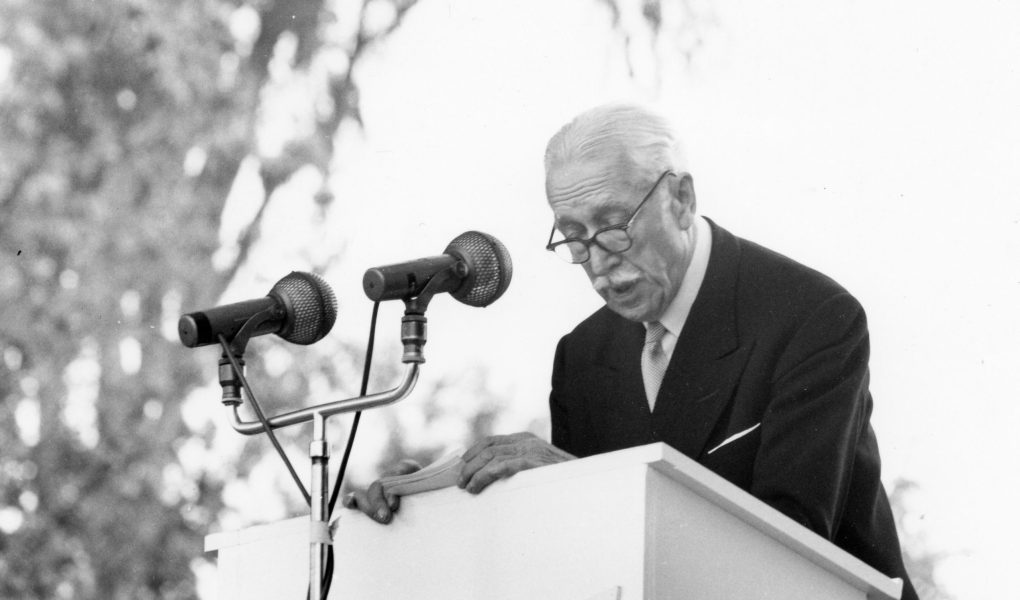marwaarsanios.info – Georges Vanier, a distinguished soldier, diplomat, and public servant, served as the 19th Governor General of Canada from 1959 to 1967. Renowned for his deep sense of compassion, devotion to service, and commitment to Canadian unity, Vanier’s tenure was marked by personal integrity and a profound connection with Canadians. A man of faith and principle, Vanier played a key role in bridging the gap between Canada’s historical ties to the British Crown and its evolving identity as an independent, multicultural nation. His leadership during a period of significant social and political change left a lasting imprint on the country.
Early Life and Background
Georges Vanier was born on May 3, 1888, in Ottawa, Ontario, into a family with strong ties to the French Canadian elite. His father, Georges-Philippe Vanier, was a prominent lawyer and politician, and his mother, Bernardine, came from a well-known family of Montreal. Georges Vanier was raised in a devout Catholic environment, and his upbringing shaped much of his character and values throughout his life.
After completing his studies at the Collège militaire royal de Saint-Jean and the Royal Military College of Canada in Kingston, Vanier was commissioned as an officer in the Canadian Army during World War I. His military service during the war proved to be a pivotal experience in his life. Vanier’s courage and resilience on the battlefield, especially during the Battle of Vimy Ridge in 1917, earned him the Distinguished Service Order (DSO). Tragically, he was severely wounded during the war, losing the use of one of his legs. Despite this injury, he continued his service and returned to active duty, demonstrating remarkable strength and determination.
After the war, Vanier turned his attention to public service and diplomacy, serving as a representative of Canada in various diplomatic posts. His work with the French government and his dedication to fostering better relations between Canada and France further developed his character as a diplomat and a global citizen.
Appointment as Governor General of Canada
In 1959, Georges Vanier was appointed as Governor General of Canada by Queen Elizabeth II, succeeding Vincent Massey. His appointment was significant for several reasons. As a decorated war hero, a respected diplomat, and a devout Catholic, Vanier embodied the values of service, sacrifice, and dedication that resonated deeply with Canadians. His personal history of overcoming adversity, including his physical disabilities, made him a figure of strength and inspiration.
Vanier’s selection was also reflective of the evolving nature of the Canadian identity. His French-Canadian heritage and bilingualism marked a shift towards a greater recognition of Canada’s diverse cultural landscape, as he represented both the French and English-speaking populations in a time of increasing unity. Furthermore, Vanier’s deep religious faith and commitment to human dignity made him a figure who appealed to a wide range of Canadians, uniting them under the common values of empathy, service, and national pride.
Leadership During His Tenure
Georges Vanier’s time as Governor General of Canada was marked by his quiet yet profound influence on the country. His approach to leadership was based on humility, personal integrity, and a deep belief in the values of compassion and respect. He brought a sense of personal dignity to the office, and his service was defined by his ability to connect with Canadians in a way that transcended traditional ceremonial roles.
Emphasizing Human Dignity and Service
One of the defining aspects of Vanier’s leadership was his strong emphasis on human dignity. Throughout his life, he was an advocate for social justice, particularly for marginalized and vulnerable communities. He believed deeply in the power of the human spirit to overcome adversity, and he worked tirelessly to promote the welfare of individuals in need. Vanier’s personal experiences, including his time as a war veteran and his own physical challenges, made him a passionate advocate for those facing struggles in society.
During his tenure as Governor General, Vanier supported numerous charitable organizations and initiatives aimed at improving the lives of people with disabilities, veterans, and those living in poverty. His empathy for others was evident in his advocacy for social reform and his commitment to promoting a more inclusive society. He worked closely with religious and secular organizations to champion humanitarian causes and emphasized the importance of love, understanding, and solidarity in national life.
A Champion for Canadian Multiculturalism
Vanier also played an important role in promoting the multicultural fabric of Canada. The 1960s were a time of profound social change in Canada, and the country was increasingly moving towards embracing diversity. The post-war period saw waves of immigration from a variety of cultural backgrounds, and Vanier recognized the importance of integrating these new citizens into the fabric of Canadian society.
As Governor General, he supported initiatives that promoted the acceptance of cultural differences and encouraged dialogue between Canada’s diverse ethnic communities. Vanier worked to ensure that the French-Canadian population, which had often felt marginalized in a predominantly English-speaking country, had a strong voice in national discussions. He saw the value in strengthening ties between Canada’s English and French-speaking communities and promoted bilingualism and a shared sense of Canadian identity.
Strengthening Canada’s International Presence
Throughout his tenure, Georges Vanier remained committed to strengthening Canada’s presence on the international stage. As a former diplomat, he understood the importance of fostering positive relationships with other nations. He worked to ensure that Canada’s foreign policy reflected its values of peace, cooperation, and human rights.
Vanier was particularly active in supporting the United Nations and Canada’s role as a peacekeeping nation. Under his leadership, Canada continued to take an active role in international peacekeeping efforts, a policy that would become central to the country’s global identity in the years to come. Vanier’s support for Canadian peacekeepers and his understanding of international diplomacy helped Canada maintain its reputation as a voice for moderation and diplomacy in global affairs.
The End of His Tenure and Legacy
Georges Vanier’s time as Governor General came to an end in 1967, and he retired to private life. He was succeeded by Roland Michener, who had been a close colleague during Vanier’s tenure. Despite his departure from the viceregal office, Vanier’s legacy continued to influence Canadian society.
Vanier’s contributions to Canadian society were not limited to his time as Governor General. He continued to work for social justice and humanitarian causes in his post-office years, establishing the Vanier Institute of the Family in 1965 to promote the well-being of families and communities across Canada. His legacy as a defender of human dignity, a promoter of social equity, and a builder of national unity lives on today in the work of various charitable organizations that continue his vision.
Georges Vanier passed away on March 9, 1967, shortly after his tenure as Governor General had concluded. His death marked the loss of one of Canada’s most beloved public figures. In recognition of his extraordinary contributions, he was posthumously remembered as a national hero, and his life continues to inspire generations of Canadians.
Conclusion
Georges Vanier’s time as Governor General of Canada was a defining period in the country’s history. His commitment to human dignity, his promotion of multiculturalism, and his emphasis on service and compassion left a lasting impact on Canadian society. A devoted father, war hero, diplomat, and leader, Vanier helped shape Canada’s national identity during a time of great change. His legacy continues to inspire Canadians to uphold the values of empathy, unity, and social justice.



